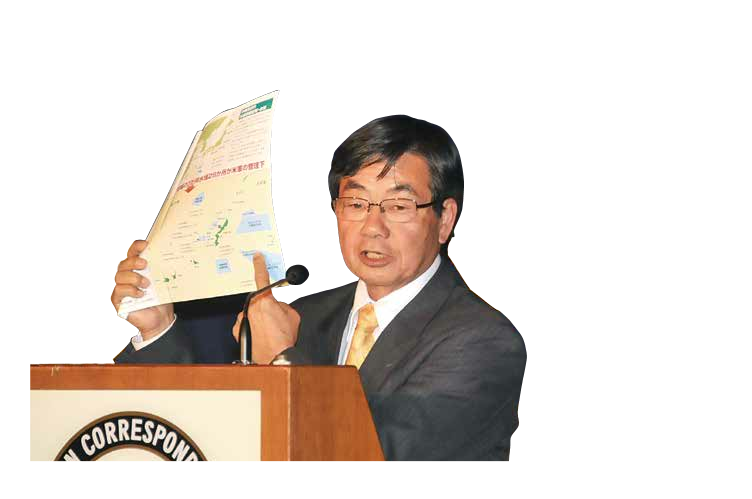Issue:
Nago’s newly re-elected Mayor Susumu Inamine wants the world to listen to his constituents’ voices
The mayor of a small city of some 61,000 people doesn’t usually attract a packed room full of foreign and Japanese journalists at the FCCJ, but Nago is no ordinary small city, and its mayor, Susumu Inamine, is no ordinary man. In fact, what Mayor Inamine managed to accomplish last January was something all of the national opposition political parties put together have failed to do since the end of 2012: to inflict a bitter electoral defeat on the Abe administration.
Prior to the election, it was government ministers and senior officials of the ruling party that were making raids into little Nago City, propping up the candidacy of challenger Bunshin Suematsu and promising generous development funds for the local economy if only the city’s residents would obey the directions of the central government and vote for their man. But Mayor Inamine weathered the government’s challenge and with his Club appearance on Feb. 13 was launching his own raid into the heart of the capital.
Before his FCCJ audience, the mayor was unequivocal: the government’s insistence that the new U.S. Marine airbase must be built at Henoko was a decision based, not upon military necessity, but rather upon domestic political expediency and structural discrimination against the Okinawan people.
“Okinawa comprises only 0.6 percent of Japan’s land area and about one percent of its population,” the mayor noted, “And since Okinawa has only about one percent of the population, our political power and influence is weak.” The military bases have been concentrated in Okinawa, he contends, because other regions in Japan have more political power than the nation’s 47th prefecture.
Mayor Inamine repeatedly explained how Okinawa’s post-1945 history had so markedly differed from that of the rest of Japan. While the U.S. Occupation of Japan ended relatively quickly in 1952 and was followed by a substantial degree of internal political independence, Okinawa was ruled as a U.S. military colony for 27 years, until 1972. Even now, it is given no choice but to host large numbers of U.S. troops and to suffer a great deal of outside political intervention, even at the local level.
The Nago mayor made it clear that he understands many important advantages have accrued to Japan through its enduring security link with the U.S., but he also pointed out that Okinawa, Japan’s poorest prefecture, has not enjoyed the same experiences as main-island Japan.
“The U.S.-Japan Security Treaty has elements of benefit and burdens for our nation. The benefit is that Japan experienced an economic development unmatched in the rest of the world. This is one of the great benefits bestowed by the alliance. But the burdens have been disproportionately borne by Okinawa, so that 74 percent of the U.S. military personnel are concentrated in our prefecture. This situation in which most of the benefits are given to one group and most of the burdens put on another group is fundamentally unreasonable.”
Mayor Inamine vowed as he did repeatedly in advance of his reelection that he would use all of the legal power at his disposal to block construction of the airbase at Henoko, and would, in fact, reject all discussions with officials that were premised on the notion that the base would be built.
He also predicted that any attempt on the part of the Abe administration to forcibly construct the base would be closely observed by the international community and would invite criticism from around the world.
One of the messages at the heart of the mayor’s presentation was that Okinawa’s problems were, in fact, challenges for all of Japan, and that he had come to Tokyo to try to make the Japanese people understand that the Henoko issue was the business of all of the nation’s people.
This is particularly the case from the standpoint of democracy, Mayor Inamine declared. “If the government forces through the relocation and denies the voice of the local people, as expressed in the election, I should say it’s unacceptable for a democratic nation.”
Indeed, one of the fundamental issues at stake in the Okinawa base issue is precisely whether Japan is to be governed by the will of the majority of the people, or by political lever-pullers in Tokyo and Washington. Whatever the benefits of the U.S. bases in Okinawa are perceived to be, if they are not acceptable to the people who live there, then they should not be acceptable to the nation as a whole. Both media polls and the results of Nago elections clearly suggest that most people in Okinawa see the U.S. forces as a greater danger to their daily lives than some hypothetical outside invader no matter how differently the Abe administration might calculate the risks.
Mayor Inamine made his appeal to the Japanese general public and the gathered foreign journalists: “Please pay more attention to the issues of Okinawa and Nago City, for these are the problems of all of Japan. At stake is the direction of democracy itself; therefore, it is a matter for the whole world as well.”
He made one last point: “I believe that what the government fears most is for understanding of the Okinawan situation to spread, and for the Japanese people to hear our voices.”

Michael Penn is President of the Shingetsu News Agency and Chair of the FCCJ Freedom of the Press Committee.

